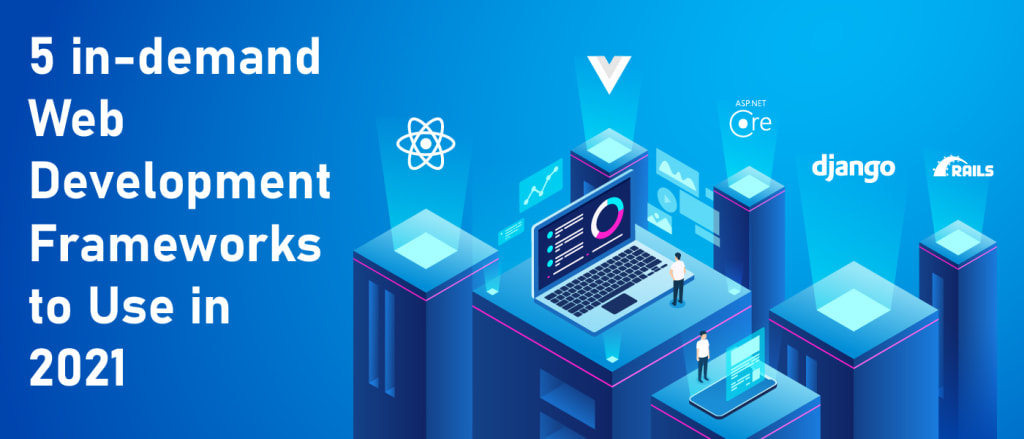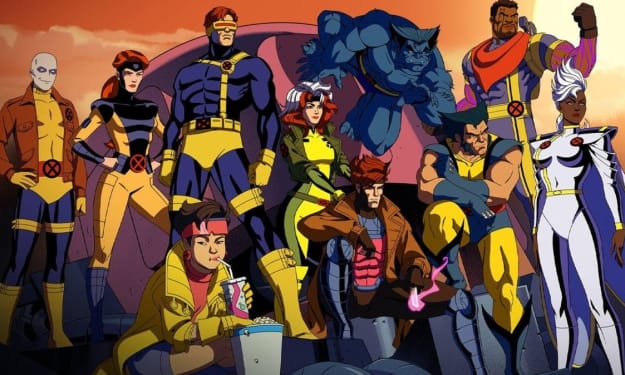5 Most Popular Web Development Frameworks of 2021
The task of picking the proper web development framework can be hard. Therefore, here is a list of the most popular web development frameworks in 2021. Read now.

When it comes to web development, you will find several different frameworks to prove beneficial for your project. With overwhelming choices available, the task of picking the proper framework is quite tricky and complex. As a business owner, you should always aim to choose a framework that would fit your goals for straight five years and at the same time goes well along with the resources of your company. Also, developers should choose a framework that has comparatively high demand in the job market.
If you are a .NET development company, you know that a basic online presence is not enough to satisfy consumers. They look forward to updating their web assets with the latest technology trends. Hence, you need to consider many factors for choosing a programming language for your project. Let us study a few popular frameworks available in detail.
Top In-Demand Development Trends
1. React
Javascript-based client-side framework dominates the current web development industry. React is developed by Facebook as the most straightforward Javascript library to implement the web's view layer. Within a very short period, React became popular among developers and enterprises.
Key Features:
- Developers can write the code once and run it everywhere. Software developers merely use React to develop any User Interface.
- Among the different client-side frameworks available, React provides the best server-side rendering with robust SEO support.
- React is the most innovative and disruptive framework. This framework has popularized one-way data binding, immutable state, and declarative programming. It also provides enhanced performance, better concurrency support, and cleaner code.
Popularity:
React is one of the most popular web development frameworks, as per several different sources' reports. As per Github, it is the second most starred framework, and the StackOverflow developer survey has also ranked it as the second most used web development framework.
When to Use and When Not to Use:
You can use React when:
- The development team has experience in javascript or is willing to take up Javascript.
- The company is looking forward to using one framework for several different platforms.
You shouldn't use React when:
- The speed of developing applications is an essential criteria.
- The development team is either not well-versed or has no experience in Javascript.
Demand in the Job Market
This framework is dominating the USA job market and the most demanded framework by enterprises.
2. Vue.js
Vue.js was developed as an MVVM (Model-View-View-Model) Javascript-based framework in 2014. It is used to create client-side applications. In this framework, the good parts of AngularJS and React are successfully combined. Eventually, the framework has grown as one of the most famous community-driven fretwork to develop web applications.
Key Features:
- Vue.js is one of the best Javascript frameworks to develop progressive web applications.
- The framework is entirely community-driven.
- Vue.js provides the end-to-end functionalities to develop applications just like Angular and the View layer with state management and external data flow just like React.
- Two-way data binding is offered, just like angular and event sourcing, and Virtual DOM is also supported like React.
Popularity:
Vue.js is evolving at a rapid pace and is used extensively in the industry and community. Vue.js is the most popularly used Javascript framework, in Asia, most notably in China. It holds different positions in terms of popularity on other platforms.
When to Use and When Not to Use
Use Vue.js for web development when:
- SEO is vital, and performance is crucial.
- You need to develop a progressive web app or modernize an extensive web application of an enterprise.
Don't use Vue.js when:
- You want to use the same framework for distinct platforms.
- Speed of the development is a significant criterion.
Demand in the Job Market
Although Vue.js is a famous framework, it is not entirely accepted by the industry. Still, job openings for Vue.js will be considerably higher in the Asian job market.
3. ASP.NET Core
Microsoft's tech stack has been modernized with modern, innovative, and futuristic design proven to fulfill the modern needs of software development needs. ASP.NET core was released as a successor of ASP.NET, and the framework is open-source and a comprehensive rework of the predecessor. This framework can work seamlessly on several platforms and can also work effectively with modern client-side Javascript frameworks.
Key Features:
- The framework can easily run on multiple platforms that include .NET frameworks, on Windows, and cross-platform .NET Core.
- The framework is specifically designed for large-scale application development and can also outperform other Web frameworks.
- The framework is enterprise-grade, server-side rendered, primarily MVC web framework.
- The framework has the best tooling support, as Microsoft also establishes famous IDEs.
Popularity:
As far as the features are concerned, ASP.NET is the best framework to build the server-side of an application. However, several developers are still working with ASP.NET, and they are not aware of the benefits offered by ASP.NET core. Nevertheless, it is also gaining popularity over time.
When to Use and When Not to Use
Use ASP.NET Core:
- In highly scalable, large-scale applications or applications that are I/O or CPU intensive.
- To develop enterprise-grade applications where multiple runtimes are required to be supported.
Don't use ASP.NET Core:
- If the main criteria are development velocity and faster release of the app.
- You are required to build a straightforward and primary application.
Demand in the Job Market:
ASP.NET core is the most recent framework on the list, and being the recent framework, its demand is relatively high. The demand will only increase shortly as companies start using ASP.NET core instead of the classic one.
4. Django
Django is a web framework for the server-side, and it follows the MTV architectural pattern. Recently, Python's popularity increased leaps and bounds, and it affected the adoption of Django to a great extent. Furthermore, several excellent features are offered, and it is presently one of the best server-side frameworks.
Key Features:
- Django provides extensibility via several pluggable apps, and you can easily plug several third-party apps.
- The framework can seamlessly work with the Python ecosystem, which is one of the most extensive ecosystems in the web development industry.
- An enterprise-grade framework that is server-side rendered, Model-Template-View, offers extra support for Reactive, Asynchronous programming.
Popularity
Django maintains a perfect balance between enterprise features and application development. That said, it is one of the most popular server-side frameworks. Django Python web development is more popular than ever it was.
When to Use and When Not to Use
Use Django:
- When you want to integrate an application with other cutting-edge projects that deal with deep learning and machine learning.
- To develop enterprise software, where the speed of developing software is crucial.
Don't use Django:
When you want to develop a fundamental and simple application.
The development is not versed in Python, and they don't have time to learn it, either.
Demand in the Job Market
Python is the most demanded programming language. That said, Django also enjoys an edge over several other web development frameworks.
5. Ruby On Rails
Ruby on Rails was developed as a server-side framework that supports the pattern of MVC and Ruby Programming language. The framework introduced several novel concepts and ideas: Don't Repeat Yourself, Convention over configuration, etc. This framework is one of the most disruptive and influenced frameworks.
Key Features
- A batteries-included framework, and it also offers everything.
- Ruby on Rails offers a breakneck development velocity.
- Extensively used in the web development industry, and several bug web applications are developed using it.
Popularity:
Ruby on Rails is not so popular today as it was in the past. The primary reason behind it is that several other languages learned from it and offered similar functionalities. Though, it is still a popular choice and has a footprint in several popular applications.
When to Use and When Not to Use
Use Ruby on Rails when:
- The development team is looking for an "all-inclusive" framework.
- The speed of development is one of the most desired aspects.
- You need to develop an application rapidly.
Don't use Ruby on Rails:
- When you need to develop a large-scale enterprise application and want a highly scalable application.
- In serverless computing as several public clouds don't support ruby.
Demand in the Job Market
The barrier of web development is now significantly lowered by Ruby on Rails. Several organizations already have a ruby on rails codebase, reflecting that the job market has a good number of openings for the framework.
Summary
We have compared the top five web development frameworks to have a clear idea of each framework's performance. All of them have their strengths and weaknesses and excel when particularly used for different projects. Weigh the pros and cons better before picking one.
About the Creator
Arjun Solanki
A Technology Enthusiast. Blogger & Author by passion. Whether you talk about passion or profession, by both I am a writer! I am a Guest Author on many reputed sites and have been sharing my knowledge since many years now.






Comments
There are no comments for this story
Be the first to respond and start the conversation.